Jordan Neely wanted help. A brutal narrative about homelessness blamed him for his own death
Damaging rhetoric and policy failures have exposed thousands of homeless Americans to the vigilante violence that killed a 30-year-old man on the subway, advocates and officials tells Alex Woodward

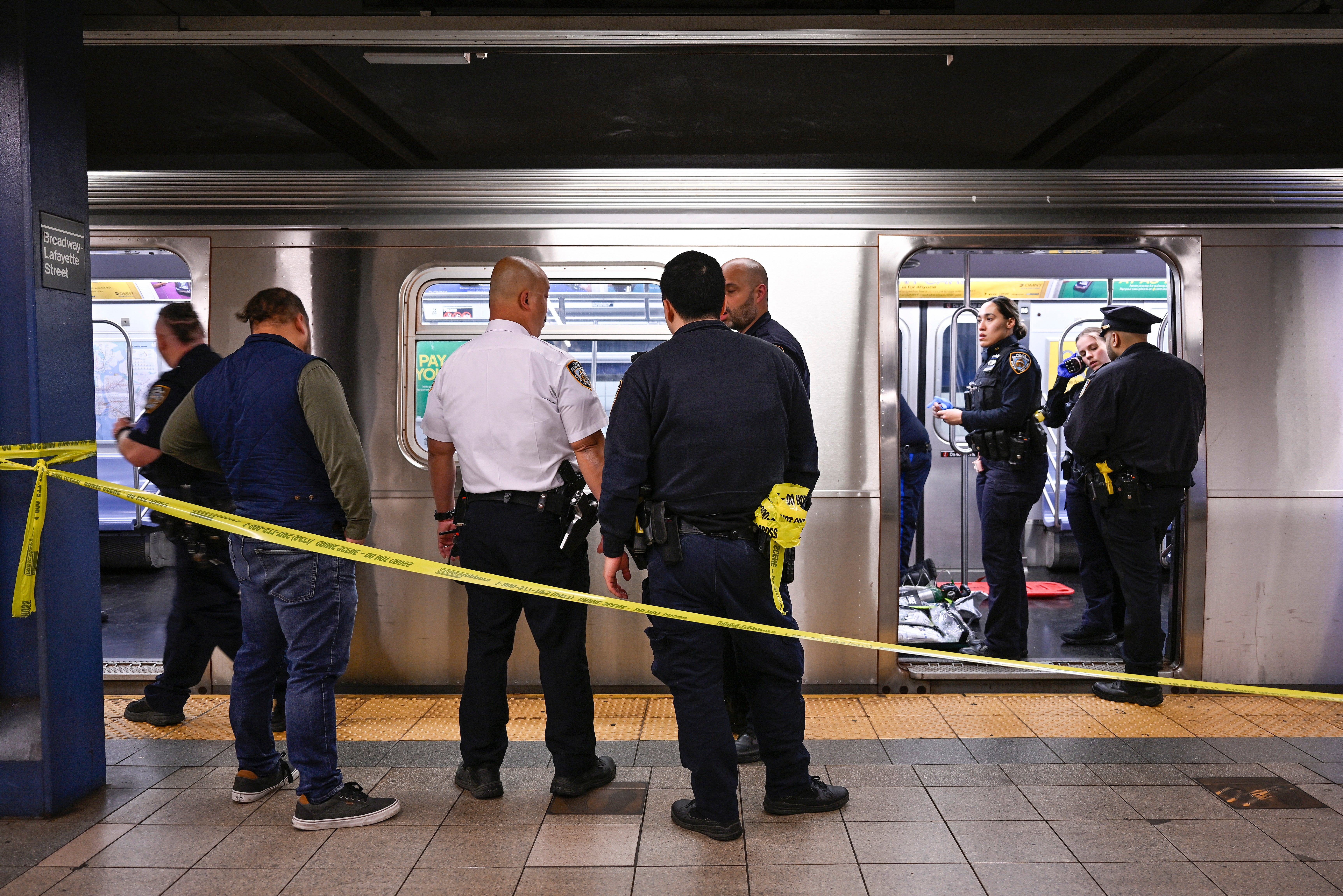
On a Monday afternoon F train in Manhattan, a passenger wrestled another man to the ground and wrapped his arm around his neck for several minutes. He died moments later.
Jordan Neely’s death was recorded by another passenger and preserved in a widely shared video. The 24-year-old former US Marine who placed Neely in a chokehold was identified by his attorneys on 5 May as Daniel Penny. He was released from police custody after the incident without any charge.
His cause of death was a homicide. The 30-year-old Black man – known for his precise Michael Jackson impersonations on subway platforms while experiencing homelessness in New York City – died from the compression against his neck, according to the city’s medical examiner.
New Yorkers are no strangers to unstable or disruptive people who ride the city’s 6,500 subway cars; subway riders typically keep to themselves and ignore them.
But Neely’s death has revived volatile media narratives about New York’s homeless population, spinning an act of vigilantism to blame the person killed by it. The mayor and governor have not explicitly condemned the act of lethal violence, raising questions among New York leaders whether the city considers the life of a homeless Black man less valuable than a white stranger prepared to use deadly force.
Advocates and lawmakers told The Independent that the deliberate and explicit rhetoric surrounding people experiencing homelessness, compounded by prolonged failures of policies meant to help them, have exposed thousands of New Yorkers and vulnerable people across the country to the kind of vigilante violence that killed Neely.
“Jordan Neely’s death was a homicide, and charges must be immediately brought against his killer,” the city’s elected public advocate Jumaane Williams said in a statement shared with The Independent. “To say anything else is an equivocation that will only further a narrative that devalues the life of a Black, homeless man with mental health challenges and encourages an attitude of dehumanization of New Yorkers in greatest need.”
Elected leaders and media coverage have created an environment “that encourages fear of and violence against people who are struggling, that paints them as a threat to public safety,” he added. “But being homeless is not a capital crime. Struggling with mental health is not a capital crime. Being Black is not a capital crime.”
‘Neely, Jordan, 30-year-old male, Undomiciled’
When he walked into a subway car on 2 May, Neely complained of hunger and thirst, according to journalist Juan Alberto Vazquez, who posted a video of part of the incident on his Facebook page.
He wrote that Neely was yelling and said he was tired, didn’t care whether he went to prison, and was ready to die. He said Neely threw his jacket to the floor of the train car before another passenger slammed him to the ground in a headlock. Others grabbed at his arms.
This continued, Mr Vazquez said, for 15 minutes, until Neely’s eyes closed and his body went limp.
Officers administered CPR on arrival, according to an incident report from the New York City Police Department reviewed by The Independent. Emergency medical personnel transported Neely to Lenox Health Greenwich Village, where he was pronounced dead.
He was identified by law enforcement as “Neely, Jordan, 30-year-old male, Undomiciled”.
Coverage in The New York Post described Neely as “unhinged” and a “vagrant”. The Federalist thanked the “brave men” who “saved riders”. On 4 May, Fox News host Greg Gutfeld blamed Neely’s death on Democratic lawmakers and George Floyd, who was murdered by Minneapolis police officer in 2020. (Derek Chauvin and three other now-former officers involved in Floyd’s death have been convicted of state and federal charges.)
Media depictions of people experiencing homelessness and mental illness, and the political debates surrounding public safety, have created “a group of people who are OK to hate and be violent toward, and the idea that society sanctions that, goes into people’s heads that they’re justified in what they’re doing,” Steve Berg, chief policy officer at the National Alliance to End Homelessness, told The Independent. “One of the ways it plays out is the violence we see, the random violence towards homeless people.”
Mayor Eric Adams said in the aftermath that “there’s a lot we don’t know about what happened here, so I’m going to refrain from commenting further,” before adding, “however, we do know that there were serious mental health issues at play here,” appearing open to the suggestion that Neely was responsible for his own death.
In an interview on CNN on 3 May, after the city’s medical examiner formally declared Neely’s death a homicide, Mr Adams said that “each situation is different” and “we don’t know exactly what happened here.”
“I was a former transit police officer, and I responded to many jobs where you had a passenger assist someone,” he added.
US Rep Alexandria Ocasio-Cortez, whose congressional district includes parts of Queens and The Bronx, said the mayor’s statement “feels like a new low”.
“Not being able to clearly condemn a public murder because the victim was of a social status some would deem ‘too low’ to care about,” she added.
Governor Kathy Hochul also avoided making an unambiguous condemnation of the killing, telling reporters on 3 May that there are “people who are homeless in our subways, many of them in the throes of mental health episodes.”
Her lieutenant governor Antonio Delgado was more blunt: “The consequences for mental health problems in New York should not be death.”
In comments to reporters the following day, nearly 72 hours after Neely’s killing, the governor clarified that Neely’s family “deserves justice.”
“This was an unarmed individual who had been on the subway many times, known by many of the regular travelers,” she said. “Sometimes people have an episode where they’re displaying their feelings in a loud and emotional way, but it became very clear that … he was not going to cause harm to these other people. And the video of three individuals holding him down until the last breath was snuffed out of him – I would say it was a very extreme response.”
The office of Manhattan District Attorney Alvin Bragg confirmed in a statement to The Independent that “senior, experienced prosecutors” are investigating the case.
“This is a solemn and serious matter that ended in the tragic loss of Jordan Neely’s life,” press secretary Douglas Cohen said in a statement shared with The Independent. “As part of our rigorous ongoing investigation, we will review the [medical examiner’s] report, assess all available video and photo footage, identify and interview as many witnesses as possible, and obtain additional medical records.”
In a statement shared with The Independent shortly after 7.30pm on 5 May, attorneys for Mr Penny said that when Neely “began aggressively threatening Daniel Penny and the other passengers, Daniel, with the help of others, acted to protect themselves, until help arrived.”
“Daniel never intended to harm Mr Neely and could not have foreseen his untimely death,” the statement added. “For too long, those suffering from mental illness have been treated with indifference. We hope that out of this awful tragedy will come a new commitment by our elected officials to address the mental health crisis on our streets and subways.”
More than 1,500 New Yorkers have died while homeless within two years
Two days after Neely’s death, dozens of protesters crowded on the Broadway-Lafayette subway platform in lower Manhattan demanding justice for his killing and an urgent need for social services to support thousands of New Yorkers like him.
In February, 74,762 people were sleeping in the city’s shelter system. That figure does not include the thousands of New Yorkers on the city’s streets and subways.
Last year, three people in New York were stabbed, one fatally, while sleeping on the street. A shooting spree across New York and Washington DC resulted in the killings of two men, and three others were injured.
That year, at least 15 homeless New Yorkers were murdered. A year earlier, 22 homeless New Yorkers were murdered. Of the 640 deaths among homeless New Yorkers in 2021, 151 were unsheltered.
In the deadliest year on record for New York’s homeless population, 815 people died while homeless in 2022.
An epidemic of violence against people experiencing homelessness in cities across the country follows a series of policy failures that have forced more than half a million Americans on the streets each night,according to the Benioff Homelessness and Housing Initiative at the University of California, San Francisco.
Last year, advocates for the city’s homeless population and other civil rights groups and city officials roundly criticised a mandate from Mr Adams to involuntarily hospitalise mentally ill New Yorkers, which would police officers permission to remove people from the city’s streets and subways regardless of whether they are believed to pose any danger to themselves or others.
They warned against increased law enforcement interaction with vulnerable populations that are more likely to be victims of crime than perpetrators.
Advocates argued that the city should instead expand access to voluntary inpatient and outpatient psychiatric care and open up all available housing and hotel space for unhoused people.
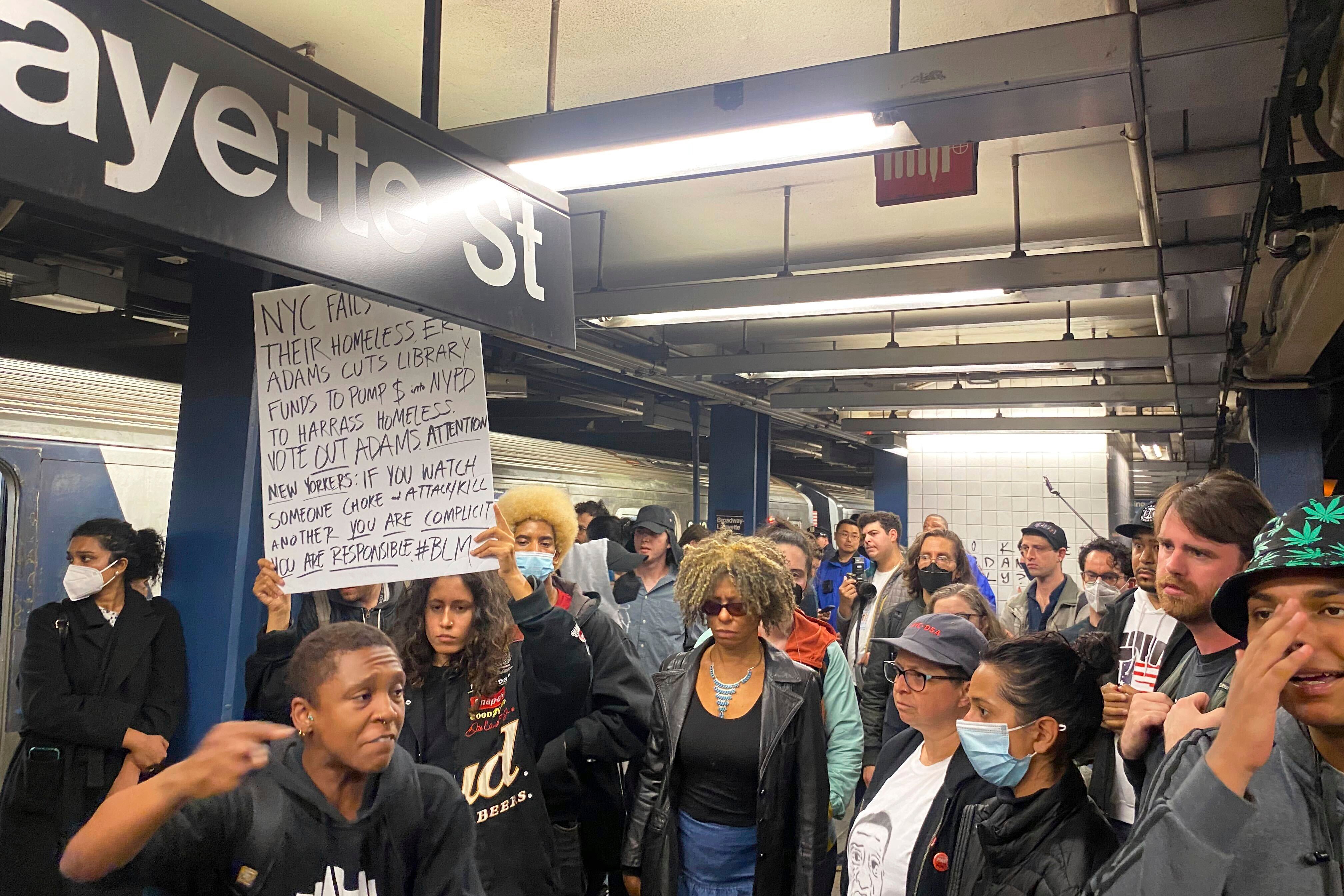
Meanwhile, state and local governments across the US increasingly are criminalising homelessness, from laws banning “public camping” or prohibiting where you can sleep or sit, or whether you can sleep in your car, loiter or ask for money, while public restrooms are closed overnight in many places. At least 47 states have laws on the books criminalizing homeless people.
“Not having housing makes it extremely difficult to try to deal with any kind of disability or health-related problem,” from being able to stay in contact with your care providers to keeping up with your appointments, according to Mr Berg with the National Alliance to End Homelessness.
“The continuation of mass homelessness is just making all these problems worse,” he said. “We have all these systems in place to intervene, but not enough investment in getting people in their own homes. The instability of any temporary housing system and the lack of permanent housing [makes it] harder to take advantage. … We know exactly what to do about it, and the public wants these problems solved.”
US Rep Daniel Goldman, whose district includes lower Manhattan, said Neely’s death underscores a desperate need for mental health services.
“Mental illness should never be a death sentence, and he would still be with us in a more caring and compassionate society,” he said in a statement shared with The Independent. “We need to better address the mental health crisis in our city and country.”
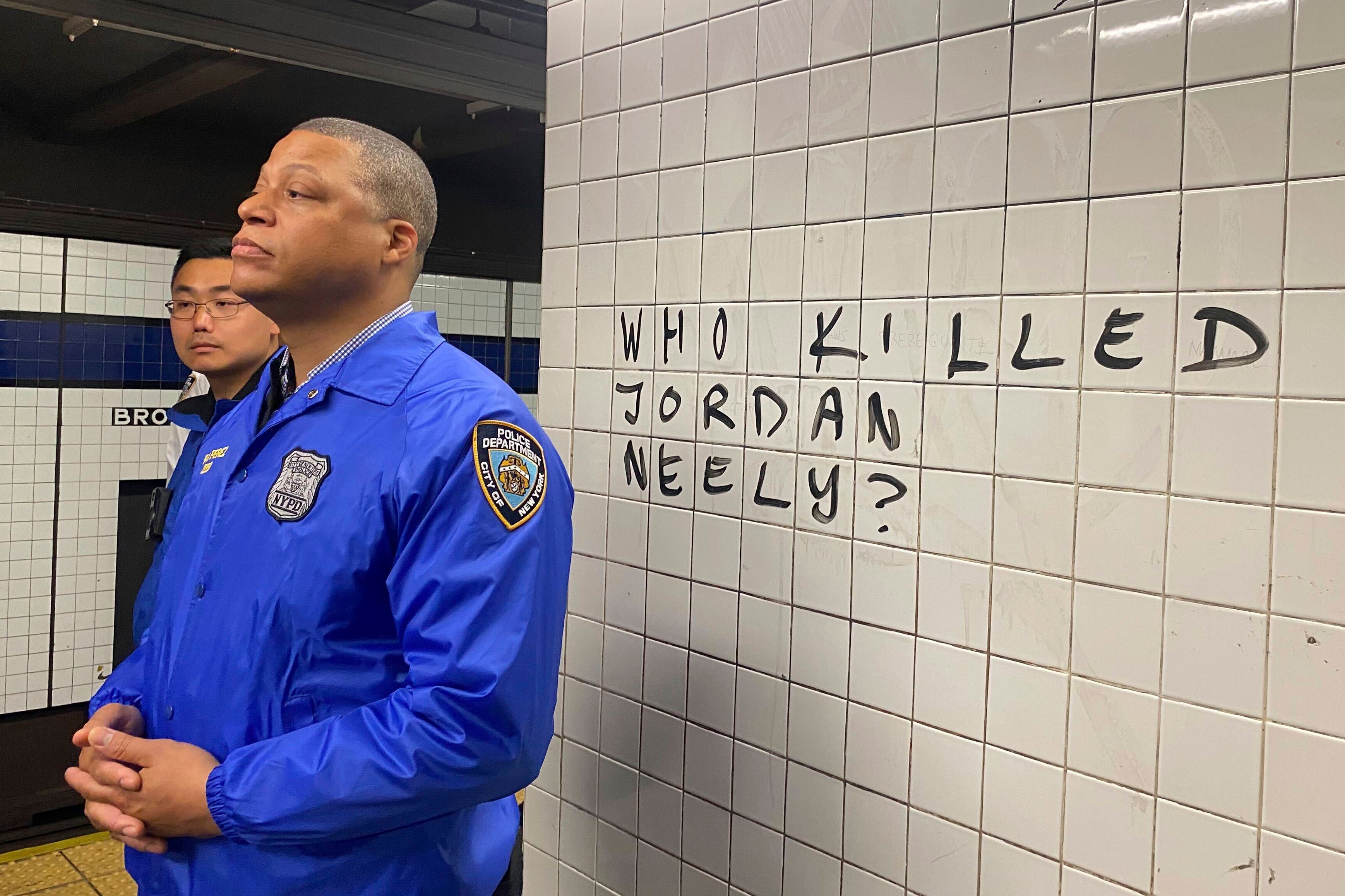
Dave Giffen, executive director with the New York-based Coalition for the Homeless, said in a statement that Neely’s killing reflects a “complete failure” of the city and state plans to “provide critical mental health services desperately needed by so many people in our city.”
“What’s more, the fact that someone who took the life of a distressed, mentally ill human being on a subway could be set free without facing any consequences is shocking, and evidences the city’s callous indifference to the lives of those who are homeless and psychiatrically unwell,” he added. “This is an absolute travesty that must be investigated immediately.”
Jawanza Williams, director of organizing of New York advocacy organisation VOCAL-NY, said the mayor and governor have “successfully campaigned to keep poor people in jails, flooded our subways with cops, and a white man can kill a Black man and be released without charge.”
“The murder of Jordan Neely is a direct result of the sustained political, systemic abandonment and dehumanization of people experiencing homelessness and mental health complexities, fueled by press coverage that clearly influences policies and emboldens vigilantes,” she said in a statement.
“Neely’s blood is on their hands, and any semblance of justice here requires accountability and a reversal of Adams’ austerity budget and Hochul to stop blocking progressive policy in Albany,” she added.
This was initially published on 4 May and has been updated with developments
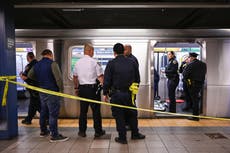
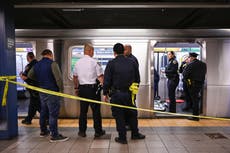




Bookmark popover
Removed from bookmarks